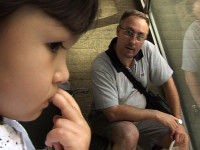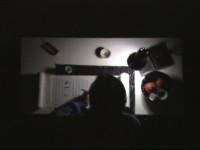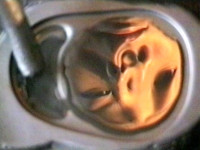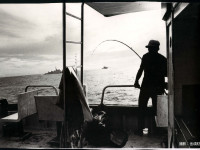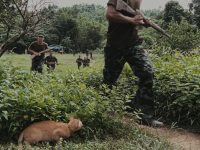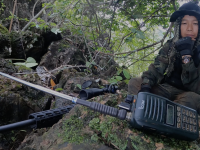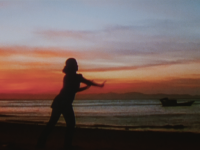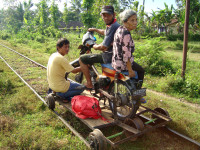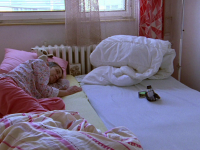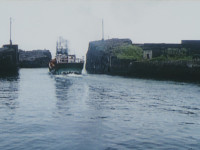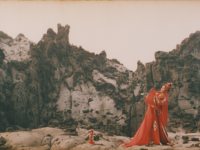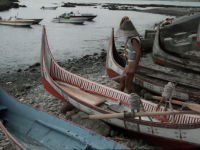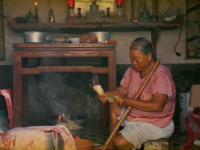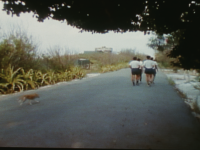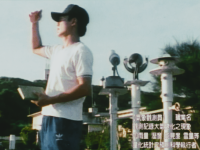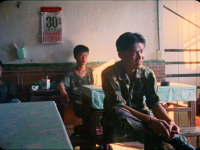07/04
- 7:00pm
- 7:30pm
- 8:00pm
- 8:30pm
- 9:00pm
- 9:30pm
- 10:00pm
- 10:30pm
- 11:00pm
- 11:30pm
- 0:00am
- 0:30am
新竹市影像博物館
Somewhere Over the Cloud
Somewhere Over the Cloud
Somewhere Over the Cloud
A series of emails that the filmmaker wrote to her late mentor, the renowned American documentary filmmaker Robert KRAMER, are woven throughout the plot of a story as the boundaries of life, distance, language, identity and nationality are re-examined from the perspective of Elodie, her daughter.
07/04
新竹市影像博物館
| Time | Programme | Venue / Info | Add to My Schedule | |
|---|---|---|---|---|
| 19:00 | Somewhere Over the Cloud | 索票去 | Add to My TIDF (Login or Register) |
07/05
- 2:00pm
- 2:30pm
- 3:00pm
- 3:30pm
- 4:00pm
- 4:30pm
- 5:00pm
- 5:30pm
- 6:00pm
- 6:30pm
- 7:00pm
- 7:30pm
- 8:00pm
- 8:30pm
- 9:00pm
- 9:30pm
- 10:00pm
- 10:30pm
- 11:00pm
- 11:30pm
- 0:00am
- 0:30am
新竹市影像博物館
Parallel World
Somewhere Over the Cloud
Parallel World
Parallel World
Using video diary footage, Parallel World chronicles the 12-year journey of Elodie, a French-Taiwanese girl with Asperger syndrome. Through Elodie's drawings and clay works, the audience can take a glimpse of her whimsical world. The film, a mother's love letter to her daughter, follows them on a journey of self-seeking and self-recognition. 'I became a mother when Elodie was born, and this new identity prompted me to contemplate culture, identity, and national boundaries. The film Somewhere Over the Cloud is a result of the contemplations. As Elodie continued to grow, I found myself examining how an individual connects with the outside world once again. 'Elodie was diagnosed with Asperger's Syndrome. She has dysgraphia but possesses a talent for drawing. As a mother, I want to equip my child with the skill sets required for her to survive in society, yet at the same time, I wonder what makes us human; wonder if I can truly understand my child's inner needs. I observe how creativity is gradually undermined when individuals are pressured by society to conform to a standard mold. But what is a normal person anyway? Isn't normality just an averaged-out result of a lot of random people? 'At the age of fifteen Elodie went to her father's country to begin a new phase of her life. I became a "Zoom Mom": The videos recorded during the past ten years have been a source of reflection on our lives. For more than 10 years, I had to freeze my emotions to continue walking the tightrope as a special child's mother and translating all these complex feelings into a documentary proved to be my outlet. 'All special children are gifts from God. These words, pictures, and videos are my self-therapy and what I would like to share with the world. Let them become the most profound love and blessing for my child.' - HSIAO Mei-ling
Somewhere Over the Cloud
Somewhere Over the Cloud
A series of emails that the filmmaker wrote to her late mentor, the renowned American documentary filmmaker Robert KRAMER, are woven throughout the plot of a story as the boundaries of life, distance, language, identity and nationality are re-examined from the perspective of Elodie, her daughter.
07/05
新竹市影像博物館
| Time | Programme | Venue / Info | Add to My Schedule | |
|---|---|---|---|---|
| 14:00 | Parallel World | 影人映後座談 | 索票去 | Add to My TIDF (Login or Register) |
| 19:00 | Somewhere Over the Cloud | 影人映後座談 | 索票去 | Add to My TIDF (Login or Register) |
07/06
- 2:00pm
- 2:30pm
- 3:00pm
- 3:30pm
- 4:00pm
- 4:30pm
- 5:00pm
- 5:30pm
- 6:00pm
- 6:30pm
- 7:00pm
- 7:30pm
- 8:00pm
- 8:30pm
- 9:00pm
- 9:30pm
- 10:00pm
- 10:30pm
- 11:00pm
- 11:30pm
- 0:00am
- 0:30am
新竹市影像博物館
Parallel World
The Falling Kite / Lettre, L’être / Love and Hope in the City
Song of Souls
Parallel World
Parallel World
Using video diary footage, Parallel World chronicles the 12-year journey of Elodie, a French-Taiwanese girl with Asperger syndrome. Through Elodie's drawings and clay works, the audience can take a glimpse of her whimsical world. The film, a mother's love letter to her daughter, follows them on a journey of self-seeking and self-recognition. 'I became a mother when Elodie was born, and this new identity prompted me to contemplate culture, identity, and national boundaries. The film Somewhere Over the Cloud is a result of the contemplations. As Elodie continued to grow, I found myself examining how an individual connects with the outside world once again. 'Elodie was diagnosed with Asperger's Syndrome. She has dysgraphia but possesses a talent for drawing. As a mother, I want to equip my child with the skill sets required for her to survive in society, yet at the same time, I wonder what makes us human; wonder if I can truly understand my child's inner needs. I observe how creativity is gradually undermined when individuals are pressured by society to conform to a standard mold. But what is a normal person anyway? Isn't normality just an averaged-out result of a lot of random people? 'At the age of fifteen Elodie went to her father's country to begin a new phase of her life. I became a "Zoom Mom": The videos recorded during the past ten years have been a source of reflection on our lives. For more than 10 years, I had to freeze my emotions to continue walking the tightrope as a special child's mother and translating all these complex feelings into a documentary proved to be my outlet. 'All special children are gifts from God. These words, pictures, and videos are my self-therapy and what I would like to share with the world. Let them become the most profound love and blessing for my child.' - HSIAO Mei-ling
Song of Souls
Song of Souls
In Shan State, Myanmar, ancient culture clashes with six decades of civil war. Once a renowned folk singer, Nan Mya Han now channels loss through metaphorical verses. A documentary intertwines her songs with scenes of rituals, delving into decay and impermanence amid political turmoil. It's a poignant, mesmerising exploration of a people's resilience amidst upheaval. 'In our country, people believe that if someone had experienced scary and frightening events, the guardian souls from the body would run away and that person would never have a dream anymore. In order to become cured of that, the soul has to be summoned back. 'Song of Souls is not only the voice of a mother who is moaning and bewailing for her vanishing children but also the sound of calling my own souls as a filmmaker.' - Sai Naw Kham
金門莿桐寫真館
誰來釣魚®?+海上邊境
Who Is Fishing®?
Who Is Fishing®?
Mentioning Diao-yu-tai evokes an immediate patriotic response in Taiwan due to the territorial dispute between China and Japan, sparked by a 1968 oil field survey in the East China Sea. 'I wouldn't say I'm shooting the Diao-yu-tai; it's more like the Diao-yu-tai is capturing me, or perhaps it is reflecting me. I never thought the Diao-yu-tai was important to me, and even now, after researching so much about the island, the more I understand it, the less I want to engage with it. I just wish it could peacefully lie there.' - Singing CHEN
07/06
新竹市影像博物館
| Time | Programme | Venue / Info | Add to My Schedule | |
|---|---|---|---|---|
| 14:00 | Parallel World | 索票去 | Add to My TIDF (Login or Register) | |
| 17:30 | The Falling Kite Lettre, L’être Love and Hope in the City | 索票去 | Add to My TIDF (Login or Register) | |
| 19:00 | Song of Souls | 專家學者映後分享 | 索票去 | Add to My TIDF (Login or Register) |
金門莿桐寫真館
| Time | Programme | Venue / Info | Add to My Schedule | |
|---|---|---|---|---|
| 18:00 | 誰來釣魚®?+海上邊境 Who Is Fishing®? | 映後座談 | 報名去 | Add to My TIDF (Login or Register) |
07/09
- 7:00pm
- 7:30pm
- 8:00pm
- 8:30pm
- 9:00pm
- 9:30pm
- 10:00pm
- 10:30pm
- 11:00pm
- 11:30pm
- 0:00am
- 0:30am
新竹市影像博物館
Cooking History
Cooking History
Cooking History
The documentary explores army cooks' impact on war outcomes, showcasing how feeding thousands shapes victories and defeats. It depicts food prep as strategic, reflecting a world where ideals are fought for around the kitchen table. Through eleven meals spanning from World War II to Chechnya, the film spans nations, illustrating culinary battles from France to Russia. 'If someone was to write it's a pacifist film, it's not true. If someone was to write it's a film that celebrates the army and the military, it's also not true. There are so many different situations and I was curious to see how human beings go about solving them. I would ask them the same questions and always get different answers. Sometimes you have to be a pacifist because you are a member of some dictator's army, but sometimes you have to grab a gun and fight for your homeland.' - Peter KEREKES
07/09
新竹市影像博物館
| Time | Programme | Venue / Info | Add to My Schedule | |
|---|---|---|---|---|
| 19:00 | Cooking History | 索票去 | Add to My TIDF (Login or Register) |
07/11
- 7:00pm
- 7:30pm
- 8:00pm
- 8:30pm
- 9:00pm
- 9:30pm
- 10:00pm
- 10:30pm
- 11:00pm
- 11:30pm
- 0:00am
- 0:30am
新竹市影像博物館
107 Mothers
107 Mothers
107 Mothers
Lesya, imprisoned for a crime of passion, faces seven years in an Odessa women's correctional facility. With her newborn, she enters a world filled solely with women—inmates, nurses, and wardens. Uniforms blur identities in this world of wives, widows, daughters, sisters, pregnant women, and children, making it hard to tell who is who. 'I also wanted the film to deliver an authentic collective testimony of the convicted mothers, not only through their conversations with Iryna but also through the silent scenes—the loneliness they feel when their children are taken away and they despairingly finish their birthday cake; the flashes of happiness when the women briefly forget they're in prison. Visually, these scenes are treated almost like a photograph—a memory of a moment independent of space and time. I believe that what defined the women's relationship towards me was curiosity. I did not ask them to do anything; I did not order them around. I simply observed and listened to them, and what they were willing to share with me, I translated into this film.' - Peter KEREKES
07/11
新竹市影像博物館
| Time | Programme | Venue / Info | Add to My Schedule | |
|---|---|---|---|---|
| 19:00 | 107 Mothers | 索票去 | Add to My TIDF (Login or Register) |
07/12
- 2:00pm
- 2:30pm
- 3:00pm
- 3:30pm
- 4:00pm
- 4:30pm
- 5:00pm
- 5:30pm
- 6:00pm
- 6:30pm
- 7:00pm
- 7:30pm
- 8:00pm
- 8:30pm
- 9:00pm
- 9:30pm
- 10:00pm
- 10:30pm
- 11:00pm
- 11:30pm
- 0:00am
- 0:30am
新竹市影像博物館
The Clinic
Knit’s Island
K-Family Affairs
The Clinic
The Clinic
In an impoverished outskirt of Yangon where the healthcare needs of the neighbourhood is great, a doctor tries to deal with the patients' problems and also his own. 'This is one of my very first films, I had a coworker, Jeu, who used to do photoshoots at weddings. He followed me around with a camera. And a Yangon Film School student, The Maw Naing, who started learning editing. In 2010, it was illegal to carry a camera on the streets and could land you in trouble with the authorities. We decided to make a film within the clinic and when we went out, we were very careful. We were first thinking of filming only me, the doctor, but it was impossible to film the doctor without the patients. By the time we made that film, there were already two separate military coups in Myanmar. The film was made 10 years after the second military coup. Almost all signs of resistance were crushed, and the people were defeated. With poverty, diseases, and darkness everywhere, people have lost almost all hope. Now, along with another military coup in 2021, this dreadful situation has returned. It is like reliving the memories and the era of hardship. I hope the film will shed light on the situation in Myanmar even after 14 years.' - Aung Min
Knit’s Island
Knit’s Island
In a 250-square-kilometre online community, individuals simulate survival scenarios through avatars. A film crew enters, forming connections with participants who gradually reveal their true selves. Blending virtual experiences with real-life stories, the documentary explores the implications of virtualisation and the evolving nature of human interaction in a digital world. 'We started our research during our studies at the Beaux-Arts. Our first intention was really just to experiment. We did not intend to make a documentary or a film in any way, but mostly just wanted to observe. The idea was to connect to a game and to go and see what was going on there, by observing, without playing. We weren't really aware of what was going on in these online games at the time. At some point we came across a player who wasn't using any of the game's tools and was just hanging out. When we saw that this was possible, to stop in a game, to simply take in the landscape and look around, to sit down with people in a virtual world, to just pause, to talk about other things, to not play in fact, we realised that it was perhaps possible to make a documentary here. That's how it started I think.' - Guilhem CAUSSE
K-Family Affairs
K-Family Affairs
Arum's parents, part of South Korea's 386 generation, aimed to secure democracy. But Arum's perspective shifts at 18 with the Sewol ferry disaster. Even her father's involvement in its aftermath prompts her to question inherited democracy. Reflecting on events like #MeToo and impeachment, Arum ponders her generation's role in shaping South Korea's political landscape. 'Constrained by my father's public service, I held back from joining protests, inspired yet unable to live up to my mother's feminist ideals. This film mirrors my quest for a political voice, threading the line between critiquing and championing the efforts of previous generations. I aspire for it to spark conversations about forging the democracy of tomorrow.' - NAM Arum
07/12
新竹市影像博物館
| Time | Programme | Venue / Info | Add to My Schedule | |
|---|---|---|---|---|
| 14:00 | The Clinic | 影人映後座談 | 索票去 | Add to My TIDF (Login or Register) |
| 16:30 | Knit’s Island | 索票去 | Add to My TIDF (Login or Register) | |
| 19:00 | K-Family Affairs | 索票去 | Add to My TIDF (Login or Register) |
07/13
- 2:00pm
- 2:30pm
- 3:00pm
- 3:30pm
- 4:00pm
- 4:30pm
- 5:00pm
- 5:30pm
- 6:00pm
- 6:30pm
- 7:00pm
- 7:30pm
- 8:00pm
- 8:30pm
- 9:00pm
- 9:30pm
- 10:00pm
- 10:30pm
- 11:00pm
- 11:30pm
- 0:00am
- 0:30am
新竹市影像博物館
My Stolen Planet
緬甸短片輯
Midwives
My Stolen Planet
My Stolen Planet
Farah, born during the Islamic revolution in Iran in 1979, captures moments of joy and defiance in her daily life and is forced to migrate to her private planet to be free. She buys other people's memories in super 8mm films and records and archives her own, to create an alternative history of Iran. 'When we share a memory with others, it moves from private to public. This story is woven tightly with a resistance to forgetting. At a time when power structures strive to narrate history in ways that hide important and popular segments, it becomes all the more crucial to share personal details and micro-narratives.' - Farahnaz SHARIFI
Journey of a Bird
Journey of a Bird
After a military coup in Myanmar on February 1, 2021, a Burmese teenager, initially depressed, decides to join a friend's media group for revolution, reigniting hope and steering his own path. 'Before the coup, I was just a filmmaker who loved making and watching films and at that time I was trying to make my first feature film. And then a coup happened, the film industry couldn't run anymore. All Burmese people's hopes and dreams were ruined. At that time, I was thinking if I can't make my first feature film, I will try to do my first documentary about the coup. So I started recording myself for a long time and Journey of a Bird was born. The documentary is about the struggle of the young generation of Myanmar but I don't want to make heavy drama stuff. Just in a natural way. Of course, the world already knows how cruel the policies and soldiers of Myanmar are, but they also need to know about how military coups make a lot of chaos in our generation.'
Losing Ground
Losing Ground
In Yangon, dreams end with a military takeover in February 2021. Amid darkness, a film emerges, capturing the struggle through written words, recorded voices, and images—a portrayal of losing ground. 'I grew up in Yangon. In February 2021, my dreams came to an end. My mother said: 'Son, wake up. The military has taken over the country.' The days got darker. The window in my narrow room and the piece of sky I watched seemed to be the only freedom left. I wanted to say something about this new undercurrent in my life.' - LG Anonymous LG Team
Midwives
Midwives
Obstetricians Hla and Nyo Nyo, a Buddhist and a Muslim, brave persecution in Myanmar to provide medical care for Rohingya women. Despite the civil war and risks, Nyo Nyo establishes a clinic, showcasing resilience in the face of political turmoil. The Sundance-prize-winning documentary captures their unwavering commitment amid a backdrop of violence and instability. 'I was born in Rakhine State, in the western part of Myanmar. When I was a kid, it seemed as though Buddhists and Muslims were able to live peacefully side by side. As an adult, I was living and working as a filmmaker in Yangon. In 2012, news of the Rohingya conflict started to come out. I refused to believe in the hate speech in the media at that time, so I went back to my hometown to better understand myself, my people, where all this anger and hatred was coming from. As a female filmmaker, I first thought of searching for a story about women in the conflict zone. Many people were saying that the Rohingya population was growing because of a lack of access to birth control. This heightened my curiosity to find midwives practising in the region. There I met two extraordinary women, a Buddhist midwife Hla and her young Muslim apprentice Nyo Nyo. This film is dedicated to women living in a conflict zone. It’s about compassion, courage, and sisterhood.' - Snow Hnin Ei Hlaing
07/13
新竹市影像博物館
| Time | Programme | Venue / Info | Add to My Schedule | |
|---|---|---|---|---|
| 14:00 | My Stolen Planet | 專家學者映後分享 | 索票去 | Add to My TIDF (Login or Register) |
| 16:30 | 緬甸短片輯 Journey of a Bird Losing Ground Comrade Poopy Comradeship (rough cut) Green Is Liberated Color | 索票去 | Add to My TIDF (Login or Register) | |
| 19:00 | Midwives | 索票去 | Add to My TIDF (Login or Register) |
07/16
- 7:00pm
- 7:30pm
- 8:00pm
- 8:30pm
- 9:00pm
- 9:30pm
- 10:00pm
- 10:30pm
- 11:00pm
- 11:30pm
- 0:00am
- 0:30am
新竹市影像博物館
流離島影#3
Shadow Dancing at Ma Tsu
Shadow Dancing at Ma Tsu
Structured around a dancer's routine, the film unfolds in four stages: hope, fear, anger, and longing for stability. It interweaves these emotions with those of locals of Matsu, the military, and first-time-visiting photographers from Taiwan island. 'Perhaps out of a reactionary mood, I told myself not to film historical tragedies or emphasise soldiers and war. Instead, I wondered if there were stories of the people of Matsu. Thus, chasing after the figure of a dancer, I embarked on the exploration of Matsu.' – CHEIN Wei-ssu
Who Is Fishing®?
Who Is Fishing®?
Mentioning Diao-yu-tai evokes an immediate patriotic response in Taiwan due to the territorial dispute between China and Japan, sparked by a 1968 oil field survey in the East China Sea. 'I wouldn't say I'm shooting the Diao-yu-tai; it's more like the Diao-yu-tai is capturing me, or perhaps it is reflecting me. I never thought the Diao-yu-tai was important to me, and even now, after researching so much about the island, the more I understand it, the less I want to engage with it. I just wish it could peacefully lie there.' - Singing CHEN
Before the Radiation
Before the Radiation
In 1998, Wuqiu was marked as a Nuclear Waste Disposal site despite protests. Islanders question the choice: ‘Why dump it here? Why not bury gold?’ As a military zone, public access is denied, leaving us defenseless if the government acts further. 'However, today, we still use the sparse population of the outlying islands as an excuse, attempting to further exploit the scarce remaining pristine land. If not for the shadow cast by nuclear waste, the islanders' lives would have been tranquil and content. But the imminent shadow of radiation quickly covered the island and shadowed people's hearts.' – Zero CHOU
The Floating Ball
The Floating Ball
Liuqiu, a tiny island on the outskirt of the Taiwan Strait, which means ‘floating ball’. Surrounded by more floating balls—’hotels-on-the-sea’ where Chinese fishermen stay. The film depict fate, humanity and destiny of these floating balls. 'Originally a joyful overseas holiday, but once the filming began, everyone except the cinematographer felt ill. Spending eight to nine hours on a dirty, oily boat, unable to use the restroom or eat, only continuously smoking and bonding with them. Then, those lacking sleep started vomiting first. Some places seem nearby, just a short ride by boat, but can people really settle there? This is where I began contemplating the fate of the outlying islands.' - LEE Chih-chiang
07/16
新竹市影像博物館
| Time | Programme | Venue / Info | Add to My Schedule | |
|---|---|---|---|---|
| 19:00 | 流離島影#3 Shadow Dancing at Ma Tsu Who Is Fishing®? Before the Radiation The Floating Ball | 索票去 | Add to My TIDF (Login or Register) |
07/18
- 4:00pm
- 4:30pm
- 5:00pm
- 5:30pm
- 6:00pm
- 6:30pm
- 7:00pm
- 7:30pm
- 8:00pm
- 8:30pm
- 9:00pm
- 9:30pm
- 10:00pm
- 10:30pm
- 11:00pm
- 11:30pm
- 0:00am
- 0:30am
新竹市影像博物館
Damnatio Memoriae
Position Among the Stars
Damnatio Memoriae
Damnatio Memoriae
This documentary, composed of various video clips and footage, is an exploration to search for some missing jigsaw pieces in history. Something that turned someone into a hero, or an absolute jerk. Some things are hidden under the carpet, from Hiroshima to Teresa Teng to the Space Race, an Olympic and the moon. 'Some things have been tricked. In the commonly known narratives, there are secrets hidden between the lines that no one has ever seen. What's repeated every single day by human beings is killing each other. Although they become sad and miserable for it, they never stop killing each other, not even for a single day. "War is over" is just another propaganda. Killing never stops; it continues and escalates callously.' - Thunska PANSITTIVORAKUL
Position Among the Stars
Position Among the Stars
Over twelve years, Leonard Retel Helmrich chronicles an Indonesian family in Jakarta's slums, revealing societal issues like corruption, religious conflicts, and economic disparity. His revolutionary camera work in this film continues the themes of his previous documentaries, and while connected, each film stands strong on its own, requiring no prior viewing to enjoy. 'I shot Position Among the Stars with the same method as the previous two documentaries, 'Single Shot Cinema,' which I developed myself. Since I follow my main characters very closely, I'm centre stage at every event, so I can shoot the situation from inside out. I have opted for this method since I realise that as an observer, I am part of the event that I am observing. As a human being I don't experience reality as a series of shots, but as one continuing event, so I shoot the situation from that perception.' - Leonard Retel HELMRICH
07/18
新竹市影像博物館
| Time | Programme | Venue / Info | Add to My Schedule | |
|---|---|---|---|---|
| 16:30 | Damnatio Memoriae | 索票去 | Add to My TIDF (Login or Register) | |
| 19:00 | Position Among the Stars | 索票去 | Add to My TIDF (Login or Register) |
07/19
- 2:00pm
- 2:30pm
- 3:00pm
- 3:30pm
- 4:00pm
- 4:30pm
- 5:00pm
- 5:30pm
- 6:00pm
- 6:30pm
- 7:00pm
- 7:30pm
- 8:00pm
- 8:30pm
- 9:00pm
- 9:30pm
- 10:00pm
- 10:30pm
- 11:00pm
- 11:30pm
- 0:00am
- 0:30am
新竹市影像博物館
Diamond Marine World
Alda
Olda
Diamond Marine World
Diamond Marine World
With 20 years of shrimp farming expertise in Taiwan, Du ventured to Myanmar, unaware of the challenges ahead—white powders and guns. Sue, a Burmese-Chinese woman with shrimp farming dreams, married Jojo and took over her father's farm. United by ambition, Du and Sue aimed to create a 'Diamond Marine World'. 'Taiwan is close to Mainland Southeast Asia. A lot of Southeastern Asian labourers come to work in Taiwan. Taiwanese people often look at economically disadvantaged Southeast Asian countries through estranged, discriminatory glasses. I traveled along the Mekong River through Thailand, Laos, Cambodia, and Vietnam for three months in 2015. During that time, I met many Taiwanese people working away from home and became curious about their work and lives in Southeast Asia. 'In Diamond Marine World, the chef from Taiwan, "Du," with his Burmese employees, "Sue," and "Jojo," work together for an opportunity to become rich. Each of them made their sacrifices and choices in the quest for success. They have also lost their trust due to inner demons and conflicts. What is the definition of success in different cultures and systems of values? To become wealthy or to live in the present? In this film, I think the audience can eventually catch sight of humanity and understand this estranged country, Myanmar.' - HUANG Hsiu-yi
Alda
Alda
Mrs. O. is suffering from dementia. Her story is told through a combination of documentary footage and her video journals. She uses a digital camera to document daily activities, memories, thoughts, and event commentaries. Through an individual story of gradual memory loss, Alda reflects the attitude of the post-communist society towards its recent history. 'I found Mrs. Oldriska by random search on the internet when I was searching for information about different malfunctions of memory. She had a blog, where she published short diary notes and simple poems. According to her profile, she suffered from Alzheimer's type of dementia. I found it interesting how she reflects on her past through the experience with the disease, what remains in the memory and what just fades and how different memories deform or reform the past, not just in some individual life, but also in so-called collective memory of a society, or country. I wrote the script of the film Alda based on our discussions and her diaries, and I used her expressions, her way of talking and reflecting reality. It is her voice-over in the film. A lot of ideas emerged spontaneously or as a result of improvisation during the recording. The lady in the picture is an actress, because for Mrs. Oldriska the shooting would be extremely exhausting, and she was OK with this kind of solution. While I was writing the script for Alda, I lent a small digital camera to Mrs. Oldriska and asked her to record for me some situations from her everyday life. I thought it might help me with the writing, and that maybe I could use some of it in the film. But when I saw the footage, it was a separate movie by Mrs. Oldriska herself. I ended up editing the material to 75 minutes and named the film Olda. With no previous experience in filmmaking, she uses the camera in a very spontaneous way, sometimes fighting with the technical limits of the device, sometimes even forgetting about the shooting itself. The result is a diary-style film dealing with aging, pain, and solitude in a raw, non-aestheticized manner. These two films are in a way complementary and they refer to different ways of approaching reality in documentary filming—an author's point of view versus the pure record of what appears to be so-called "authentic reality.' - Viera ČÁKANYOVÁ
Olda
Olda
Ms. Oldřiška, diagnosed with Alzheimer's, lives with her dog in an apartment in Brno in the Czech Republic. Using a basic camera, she captures daily challenges, visits from her friend and son, and her apartment's reconstruction. The film explores ageing, pain, solitude, and the love for both people and animals. 'I found Mrs. Oldriska by random search on the internet when I was searching for information about different malfunctions of memory. She had a blog, where she published short diary notes and simple poems. According to her profile, she suffered from Alzheimer's type of dementia. I found it interesting how she reflects on her past through the experience with the disease, what remains in the memory and what just fades and how can different memories deform or reform the past, not just in some individual life, but also in so-called collective memory of a society, or country. I wrote the script of the film Alda based on our discussions and her diaries, and I used her expressions, her way of talking and reflecting reality. It is her voice-over in the film. A lot of ideas emerged spontaneously or as a result of improvisation during the recording. The lady in the picture is an actress, because for Mrs. Oldriska the shooting would be extremely exhausting, and she was OK with this kind of solution. While I was writing the script for Alda, I lent a small digital camera to Mrs. Oldriska and asked her to record for me some situations from her everyday life. I thought it might help me with the writing, and that maybe I could use some of it in the film. But when I saw the footage, it was a separate movie by Mrs. Oldriska herself. I ended up editing the material to 75 minutes and named the film Olda. With no previous experience in filmmaking, she uses the camera in a very spontaneous way, sometimes fighting with the technical limits of the device, sometimes even forgetting about the shooting itself. The result is a diary-style film dealing with aging, pain, and solitude in a raw, non-aestheticized manner. These two films are in a way complementary and they refer to different ways of approaching reality in documentary filming—an author's point of view versus the pure record of what appears to be so-called “authentic reality.' - Viera ČÁKANYOVÁ
米倉生活館
An Asian Ghost Story / Journey of a Bird / Comrade Poopy / Comradeship (rough cut)
An Asian Ghost Story
An Asian Ghost Story
This film is about haunting memories of Asia's late 20th-century modernisation, beginning with a 1965 United States embargo on the hair trade, known as the 'Communist Hair Ban'. 'Wigs were vital for the rise of the Asian economy in the post-war era. In the heyday of the 1960s, it was the number four export in Hong Kong's export-oriented industrialisation. Between Mao's China—the largest source of hair supplies, and the insatiable Western market, Hong Kong functioned as the gateway. In 1965, the U.S. Treasury Department imposed an embargo on "Asiatic hair" to cut off foreign currency to Communist China in the hair trade. The highly racialized category of "Asiatic hair" was later revised as "communist hair," to enable the wig industry to develop in U.S. allies, including mainly South Korea and Japan, which led to a significant reconfiguration of light industry in East Asia. Departing from the moment of the communist hair ban, through stories of movement, diaspora and migration, this project examines the role of Hong Kong as a transient space that mediates and sanitises the connection between different worlds. The relationship between U.S. Imperialism and East Asia order in the Cold War era.' - WANG Bo
Journey of a Bird
Journey of a Bird
After a military coup in Myanmar on February 1, 2021, a Burmese teenager, initially depressed, decides to join a friend's media group for revolution, reigniting hope and steering his own path. 'Before the coup, I was just a filmmaker who loved making and watching films and at that time I was trying to make my first feature film. And then a coup happened, the film industry couldn't run anymore. All Burmese people's hopes and dreams were ruined. At that time, I was thinking if I can't make my first feature film, I will try to do my first documentary about the coup. So I started recording myself for a long time and Journey of a Bird was born. The documentary is about the struggle of the young generation of Myanmar but I don't want to make heavy drama stuff. Just in a natural way. Of course, the world already knows how cruel the policies and soldiers of Myanmar are, but they also need to know about how military coups make a lot of chaos in our generation.'
07/19
新竹市影像博物館
| Time | Programme | Venue / Info | Add to My Schedule | |
|---|---|---|---|---|
| 14:00 | Diamond Marine World | 影人映後座談 | 索票去 | Add to My TIDF (Login or Register) |
| 17:30 | Alda | 索票去 | Add to My TIDF (Login or Register) | |
| 19:00 | Olda | 索票去 | Add to My TIDF (Login or Register) |
米倉生活館
| Time | Programme | Venue / Info | Add to My Schedule | |
|---|---|---|---|---|
| 14:00 | An Asian Ghost Story Journey of a Bird Comrade Poopy Comradeship (rough cut) | 映後座談 | 報名去 | Add to My TIDF (Login or Register) |
07/20
- 2:00pm
- 2:30pm
- 3:00pm
- 3:30pm
- 4:00pm
- 4:30pm
- 5:00pm
- 5:30pm
- 6:00pm
- 6:30pm
- 7:00pm
- 7:30pm
- 8:00pm
- 8:30pm
- 9:00pm
- 9:30pm
- 10:00pm
- 10:30pm
- 11:00pm
- 11:30pm
- 0:00am
- 0:30am
新竹市影像博物館
Guapo'y
Ten Years Myanmar
Nargis - When Time Stopped Breathing
Guapo'y
Guapo'y
Celsa covers her skin with roots and leaves from her jungle-like garden. She wants to heal. She still feels prison and torture endured 45 years ago in a concentration camp in Paraguay. However, the past echoes; the country is ruled by the son of the former dictator's right-hand man. 'For me, Guapo'y is the confirmation that stories find us. They are voices and tracks that rise up thanks to their protagonists' drive. With her kindness and simplicity, Celsa teaches me the importance of fighting together, and that healing cannot be carried out without encountering oneself first, one's images and memories. Celsa's journey represents the need of the Paraguayan people. The need not to forget and not to allow oblivion to be enacted by current leaders who defend the worst years of a country's history, years of horror and silence. Guapo'y is an urgent tale of an aching body that needs to heal'. - Sofía PAOLI THORNE
Ten Years Myanmar
Ten Years Myanmar
As the latest instalment of the Ten Years franchise, the omnibus film Ten Years Myanmar is a collective effort from five Myanmar filmmakers to speculate on the future of the country that has been torn apart since the coup in 2021. Production Note: The result is five very different scenarios and visions, some grim and some more hopeful, and all together will inspire the Myanmar and international audience to stay resilient in times of adversity. All five of the filmmakers have continued to live and work in Myanmar, even after many fellow filmmakers have left, and this film also serves as a model for those working in environments where freedom of expression is limited in how to express their thoughts and feelings, some of which may be controversial.
Nargis - When Time Stopped Breathing
Nargis - When Time Stopped Breathing
In May 2008, Cyclone Nargis hit Myanmar's Ayeyarwaddy Delta, claiming 140,000 lives. Despite a filming ban, young Burmese filmmakers clandestinely visited devastated villages after the storm, capturing surreal scenes of loss and resilience. Their emotional footage reveals the profound impact of Nargis, depicting a world where life and death intertwine, altering countless lives forever. For security reasons, the filmmakers couldn't reveal their names and they used pseudonyms. But for the first time, they screened the film with their real names at the 2nd Wathann Film Festival in 2012. One of the directors Pe Maung Same said the screening of Nargis for the first time in Myanmar was their apology to those who were in the film. 'I feel ashamed that we couldn't use our real names due to security reasons when people in the movie dared to show their faces in front of the camera. I want to apologise to them. I want them to understand us. Things are open now and we get the chance to apologise by screening the film here,' he said.
07/20
07/23
- 7:00pm
- 7:30pm
- 8:00pm
- 8:30pm
- 9:00pm
- 9:30pm
- 10:00pm
- 10:30pm
- 11:00pm
- 11:30pm
- 0:00am
- 0:30am
新竹市影像博物館
Taman-taman (Park)
Taman-taman (Park)
Taman-taman (Park)
Taman-taman (Park): Two Indonesian poets meet at Tainan Park, using daytime experiences to craft poetry. Inspired by encounters and emotions, their creations take shape through night-time chanting, imagination, and action. Taman-taman (Park) unfolds a journey resembling an ancient fable, with untold stories hidden in the endless night. The storytellers become integral parts of the narratives as well. 'If we describe it with landscape painting, no matter how realistic it is, the painter cannot bring the scenery in front of them into the exhibition hall. However, looking at the landscapes that the painter has selected, modified, and embellished, sometimes the soul can be taken to a further place. Or, the painting itself is already an independent scenery, whether as a whole or in detail; it makes people yearn for or fear. Sometimes, when looking at landscape paintings, imagining the painter facing the scenery across this canvas, gradually, it also becomes a part of the scenery.' - SO Yo-hen
07/23
新竹市影像博物館
| Time | Programme | Venue / Info | Add to My Schedule | |
|---|---|---|---|---|
| 19:00 | Taman-taman (Park) | 影人映後座談 | 索票去 | Add to My TIDF (Login or Register) |
07/25
- 7:00pm
- 7:30pm
- 8:00pm
- 8:30pm
- 9:00pm
- 9:30pm
- 10:00pm
- 10:30pm
- 11:00pm
- 11:30pm
- 0:00am
- 0:30am
新竹市影像博物館
流離島影#2
Turtle Island: Nostalgic Voices
Turtle Island: Nostalgic Voices
When fishing at sea, he always glimpses Guishan Island. Childhood memories and the villagers' distinct qualities were buried there during the village’s relocation. 'Now, we hide our homesickness in dreams'. Witnessing the island's tourism deeply affects displaced islanders. 'I originally thought my relationship with Guishan Island was close... but it was wishful thinking, my own imagination. Should I stand in their shoes or mine? What exactly defines my standpoint? I'm quite uncertain. Is this film meant to speak for them or to make everyone want to visit the place? Eventually, I realised everything was filmed for my nostalgia.' - LEE Yung-chuan
Trouble
Trouble
When a boat sets off, passengers may anticipate their destination's appearance. Some believe imagination can transport them, while others need firsthand experience. The story of Keelung Islet documents both a process and a state of consciousness. 'Emotions change faster than the body, so nothing can be permanently recorded. Sometimes I think, if only I could simplify myself, would things be better? But I refuse to give up. When everything is filled with trash, why do you still demand excellence? The place where the island is located is a transient world, so perfection and imperfection always coexist…' – Jimmy WU
Libangbang: Ching-Wen's Not Home
Libangbang: Ching-Wen's Not Home
The film was shot in two periods. Initially, during Kuo's visit to Ching-wen rebuilding his parents' home, unplanned as a documentary. Later, funding came, but Ching-wen left for Taipei. Kuo returned to Orchid Island, capturing memories of Ching-wen. 'Over these years, moving between Taiwan and Orchid Island, I shared many joyful moments with Ching-wen. I hoped to document his life on the island and even wrote a script for him. Yet, after years of waiting, when I finally received a bit of funding to film, he had to leave Orchid Island.' – KUO Chen-ti
West Island
West Island
West Island lies south of Penghu, under a square kilometre in size. At its peak, around 200 people lived here, but by 1999, only few remained. It's uncertain if their departure was coincidental. Both the island and its inhabitants have faded into obscurity. 'You just need to stand at the highest point on the island. In the morning, you can watch the sunrise, and in the afternoon, you can watch the sunset there. Standing at one spot, you can see the entire island in 360 degrees. It feels like the area where you can land is very small, but your vision is incredibly vast.' - CHU Hsien-che
07/25
新竹市影像博物館
| Time | Programme | Venue / Info | Add to My Schedule | |
|---|---|---|---|---|
| 19:00 | 流離島影#2 Turtle Island: Nostalgic Voices Trouble Libangbang: Ching-Wen's Not Home West Island | 索票去 | Add to My TIDF (Login or Register) |
07/27
- 2:00pm
- 2:30pm
- 3:00pm
- 3:30pm
- 4:00pm
- 4:30pm
- 5:00pm
- 5:30pm
- 6:00pm
- 6:30pm
- 7:00pm
- 7:30pm
- 8:00pm
- 8:30pm
- 9:00pm
- 9:30pm
- 10:00pm
- 10:30pm
- 11:00pm
- 11:30pm
- 0:00am
- 0:30am
新竹市影像博物館
The Trial
流離島影#1
Three Strangers
The Trial
The Trial
In 1985 Buenos Aires, the trial of Argentina's last dictatorship unfolds, reminiscent of Nuremberg after WWII. Recorded on U-matic tapes, 90 days reveal testimonies of horror and a final verdict: 'Never Again'. The film delves into defenders, political positions, and victims' voices, narrating tales of torture and pain, encapsulating life and death within a courtroom. 'The 90 days that the trial lasted were entirely recorded by the public television with two cameras on U-matic cassettes. The search for and access to the trial archive, 530 hours of footage, began in 2013. Dreaming about a documentary film that narrates what happened there, and at the same time tells the story of the Argentine horror and its justice process. 'It was not easy to find the material. At the public television channel, which was in charge of the recording, they denied me any kind of collaboration for fear of political reprisals. At the General Archive of the Argentine Nation (AGN), which has the material in custody, they suggested that in order to avoid inconveniences I should look for the material at the University of Salamanca in Spain, which also has a copy of the material in custody. It seemed incredible. More than three decades after the trial, it still raised fears and reservations in small officials unable to make a decision and take the risks. 'In 2019, after much walking, I learned, through my friends at the Luisa Hairebedian Foundation that the archival material, the 530 digitised hours, are in the custody of Memoria Abierta NGO. We met with the team, agreed on the guidelines to work together and then, finally, we were ready to start visualising the archive…. The Trial is the first cinematographic work that deals exhaustively with the archive of the Trial of the Juntas, the cornerstone of the process of justice for crimes against humanity in Argentina and it is an invaluable document for Humanity'. - Ulises DE LA ORDEN
<The Pratas Islands>...Tong-Sha, an Isle Like a Crab
<The Pratas Islands>...Tong-Sha, an Isle Like a Crab
The soldier's written words breathe life into the desolate and shell-covered Tong-Sha Island, transforming it into a vivid landscape. It's a place where many men seem symbolically bound, unvisited yet too precious to forsake. 'Being used to a certain way of looking, listening and understanding, we are often presumptuous about our judgments. As a filmmaker, I made the same mistake at the beginning of the shoot. I didn’t choose the subject; it is the subject that chose me.' - LEE Meng-zhe
Silent Delta
Silent Delta
What do the islands want to convey? We hear nothing but silence. The souls of these islands long for the past, yet forever trapped in this space. The film symbolises their struggles, offering silent contemplation without firm conclusions. 'Originally, this project aimed to speak from a so-called borderland perspective. Now, I'm somewhat concerned that such a viewpoint might be delusional. At least, for the "Northern Three Islands", if we talk about respecting the land, and respecting nature, then we should also learn true abandonment. Perhaps from my perspective... their silence might indeed be the most appropriate voice.’ - SHEN Ko-shang
03:04
03:04
Old folks waiting for a good coffin, children waiting to leave the island, soldiers anticipating military retirement... Trees waiting for wind, wind seeking rocks, rocks waiting for man’s return, and I’m waiting for the movie to end. 'This is my hometown. When I first picked up the camera to praise you, what I saw was your abandoned face. Only 16 minutes, yet my feelings were so heavy and fearful. That island, the island I want to return to but don't know how... I think this is a movie that (Kinmen) islanders dare not see...' - HUANG Ting-fu
Three Strangers
Three Strangers
Gwa To, a transgender expects relationship impermanence, assuming women will prefer "real" men. Ma Soe is disillusioned with marriage from her father's drinking. After a period of courtship, the two live together as a couple. Their bond is tested when Gwa To brings home Phoe Htoo, a two-month-old boy seeking adoption. 'Their story makes me think of my childhood: what it could have been if I was raised by my parents. But more importantly, it gave me a chance to understand the strength of parental love and what it means to be a family. I made this documentary as a tribute to this unconditional love and the bonds that it creates.' - Lamin Oo
07/27
新竹市影像博物館
| Time | Programme | Venue / Info | Add to My Schedule | |
|---|---|---|---|---|
| 14:00 | The Trial | 索票去 | Add to My TIDF (Login or Register) | |
| 17:30 | 流離島影#1 <The Pratas Islands>...Tong-Sha, an Isle Like a Crab Silent Delta 03:04 | 索票去 | Add to My TIDF (Login or Register) | |
| 19:00 | Three Strangers | 索票去 | Add to My TIDF (Login or Register) |
08/06
- 8:00pm
- 8:30pm
- 9:00pm
- 9:30pm
- 10:00pm
- 10:30pm
- 11:00pm
- 11:30pm
- 0:00am
- 0:30am
澎湖植隱冊室
Remember Me
Remember Me
Remember Me
HUNG Chun-hsiu spent seven years filming three residents of Kinmen island: an owner of a local photography shop, a retired officer and a Chinese woman from Sichuan province who came to Kinmen with the hope for a better future. Using photographs and archival materials, HUNG explores the personal stories of three residents and how they reflect upon the upheavals between the two sides of the Taiwan Strait.
08/06
澎湖植隱冊室
| Time | Programme | Venue / Info | Add to My Schedule | |
|---|---|---|---|---|
| 20:00 | Remember Me | Add to My TIDF (Login or Register) |

